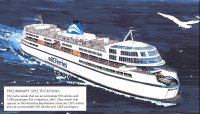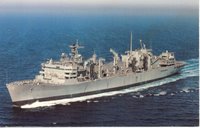At the last "up island meeting" of the Vancouver Island Branch of the Canadian Institute of Marine Engineering, I met with many peers. Even had dinner with one fellow with BC Ferries at Departure Bay, in Nanaimo, where the new Super C Class ships will soon ply.
I grilled him, thanks for the chat by the way, and I must say I am still quite a bit stunned to hear what he said. As some of you may know, the Super C class will be diesel electric boats, a major turn from the usual for BC Ferries. So I asked how many electricians would be onboard, the answer was really like, "huh, electrician what electrician, onboard, na, well just use the terminal one". Now I am not sure if he was fully in the know, but from other topics, it would appear that he might be relatively well informed of the project. That's why I am still in bit in disbelief.
what he said. As some of you may know, the Super C class will be diesel electric boats, a major turn from the usual for BC Ferries. So I asked how many electricians would be onboard, the answer was really like, "huh, electrician what electrician, onboard, na, well just use the terminal one". Now I am not sure if he was fully in the know, but from other topics, it would appear that he might be relatively well informed of the project. That's why I am still in bit in disbelief.
In perspective, for our ship's 55,000 HP diesel electric plant we have in the engine room, 7 engineering officers and 5 engine room electrical officers, and one on the hotel side. So roughly 40% of the officers in the engine room are electrical.
Then I ran across the quasi civilian US military Sealift Command (MSC) website which I found d an interesting newsletter published in November 2005. The MSC Engineering maintenance Branch Bulletin had an article on the amount of preventive tasks that were related to shipboard electrical components. On their fleet of supply vessels, they found that 29% of the preventive maintenance task tracked by their maintenance software was electrical. Granted these ships are relatively complicated, but then again, these ships are not even diesel electric.
d an interesting newsletter published in November 2005. The MSC Engineering maintenance Branch Bulletin had an article on the amount of preventive tasks that were related to shipboard electrical components. On their fleet of supply vessels, they found that 29% of the preventive maintenance task tracked by their maintenance software was electrical. Granted these ships are relatively complicated, but then again, these ships are not even diesel electric.
Basically it seems that around 30% of the staff onboard should be electricians or the likes. I don't know about you but it would seem to me that at least one electrician should be onboard if they want to maintain a certain degree of reliability. One thing is for sure I don't see too many electrician on the coast now, or training being done to make sure engineers are able to handle high voltage installations. And I haven't really heard of any real talk of electrician and their marine certification at Transport Canada either. Sound like troubles' abrewing.
We are not talking about small 30 car ferries that can skip a couple of sailing here and there; I would hate to see bad press over breakdowns and the likes because of poor planning. I wonder if anyone has any thoughts on this. I know Washington State Ferries have diesel electric set ups, I wonder if anyone knows how many electricians they sail with, or how do they look after electrical maintenance?
Its been a few years since I noticed a major lack of electrical training in the marine field, other than basic stuff, especially since it is mostlikely the propulsion choice of the future for quite a few good reasons.
Here's a quote from allbussiness.com about the Super C Class: "The ships will achieve a design service speed of 21 knots fully loaded at 85%MCR using a diesel-electric propulsion/power station concept, with four prime movers each providing 4,000 kW (5,400 hp) to supply electric power for two 11,000 kW (14,750 hp) propulsion motors, auxiliary systems and public spaces. The diesel-electric concept also provides a high level of redundancy, with a speed of 20 knots maintained with one engine off-line for servicing and 18 knots with two prime movers off-line."
The main engines will be MAKs, here's Cat's press release about the engines.
Martin
 what he said. As some of you may know, the Super C class will be diesel electric boats, a major turn from the usual for BC Ferries. So I asked how many electricians would be onboard, the answer was really like, "huh, electrician what electrician, onboard, na, well just use the terminal one". Now I am not sure if he was fully in the know, but from other topics, it would appear that he might be relatively well informed of the project. That's why I am still in bit in disbelief.
what he said. As some of you may know, the Super C class will be diesel electric boats, a major turn from the usual for BC Ferries. So I asked how many electricians would be onboard, the answer was really like, "huh, electrician what electrician, onboard, na, well just use the terminal one". Now I am not sure if he was fully in the know, but from other topics, it would appear that he might be relatively well informed of the project. That's why I am still in bit in disbelief. d an interesting newsletter published in November 2005. The MSC Engineering maintenance Branch Bulletin had an article on the amount of preventive tasks that were related to shipboard electrical components. On their fleet of supply vessels, they found that 29% of the preventive maintenance task tracked by their maintenance software was electrical. Granted these ships are relatively complicated, but then again, these ships are not even diesel electric.
d an interesting newsletter published in November 2005. The MSC Engineering maintenance Branch Bulletin had an article on the amount of preventive tasks that were related to shipboard electrical components. On their fleet of supply vessels, they found that 29% of the preventive maintenance task tracked by their maintenance software was electrical. Granted these ships are relatively complicated, but then again, these ships are not even diesel electric.